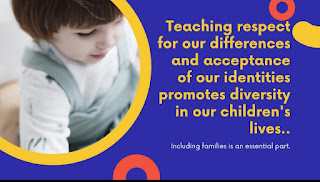The journey is about to begin
After living all kinds of experiences of knowledge, today you reached one more step in your professional education. When you began several years ago, you thought about your goals and desires and how you were going to contribute to the early childhood field, children, families, and colleagues. Probably, at that moment, you did not know many things and you did not think how high would increase your passion for serving children and families.
Learning and knowledge
I'm sure that for you the same as me, the list of acquired knowledge could take a long time to complete. I going to share with you three major new knowledge I gained and I think it needs to be stuck to all early childhood professionals. First, the great importance of collaboration. Collaboration means connecting with people related to the field, children, families, community members, colleagues, and other professionals of other fields that support the learning and development of children. We need to collaborate if we want all of them to be successful. Communities of practice are a great example and an opportunity for us to grow as collaborators. Second, the awareness of teaching diversity. We have huge accountability in teaching and modeling respect, tolerance, acceptance, and inclusion of diversity in the early childhood curriculum and in all settings of early childhood programs. For me, the most important step is setting aside our own hidden biases and being aware of microaggression in our comments and behavior. Third, to keep our professional goals linked to the mission, vision, and values of the early childhood program. The mission, vision, and core values will guide our decisions, services, and all that involve the planning, managing, and administering of an early childhood program to benefit all.Short and long-term goals
As I stated earlier, our journey is about to begin. With the knowledge, we gained and the passion that drives us to be better professionals each time, we need to think and be inspired by new short and long-term goals to accomplish our careers and to support the hundreds of lives we are going to impact. Establishing goals and stay working on them, make you develop and grow as a professional. You want to serve, serve with dignity! Keep in mind the issues and trends in the early childhood field and work toward them. Find your passion and go for it! Collaborate with others! Create opportunities for you, your colleagues, and the people you will serve! Connect with others and join organizations that support and advocate for the early childhood field and the well-being of children and families.
Remember that learning is a path that never ends. Knowledge is the key to making you an informed, educated, and prepared early childhood professional capable of changing positively the lives of others!
“CHOOSE A JOB YOU LOVE, AND YOU WILL NEVER HAVE TO WORK A DAY IN YOUR LIFE."
—Confucius
_______________________
Diana A. Rivera is an Early Childhood Educator, with graduate studies in Educational Psychologist, and author of Be the voice for children. Diana believes and commits to the healthy development, growth, well-being, and learning of all children. The blog posts share ideas and knowledge about educational psychology, child and brain development, parenting, diversity, effective teaching practices, early childhood education, and care to support the empowerment of children and families.










